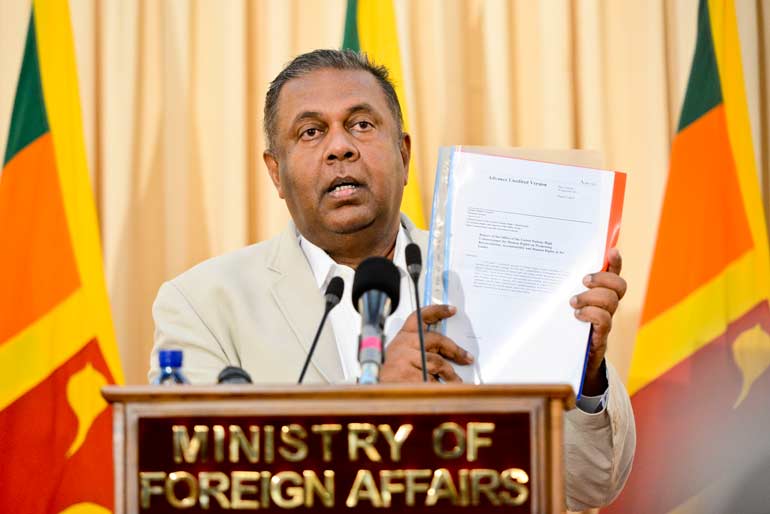Monday Feb 23, 2026
Monday Feb 23, 2026
Friday, 18 September 2015 00:00 - - {{hitsCtrl.values.hits}}
 Foreign Minister Mangala Samaraweera - Pic by Daminda Harsha Perera
Foreign Minister Mangala Samaraweera - Pic by Daminda Harsha Perera
By Uditha Jayasinghe
Foreign Minister Mangala Samaraweera yesterday downplayed the report released by the UN Human Rights Council (UNHRC), insisting the Sri Lankan Government has the capacity to garner sufficient international support for the proposed domestic mechanism, which it hopes to kick off in mid-October.
Samaraweera, addressing journalists for the first time since his return from Geneva and trip to New Delhi with Prime Minister Ranil Wickremesinghe, emphasised plans to start consultations with a range of stakeholders including political parties, religious leaders, civil society and victims of the crimes outlined in the 251 paged UNHRC report by the second week of October. He expressed hope that a domestic mechanism would be hammered out by January and implemented within 18 months.
President Maithripala Sirisena will also be involved in the process after he returns from the UN General Assembly where he is expected to hold discussions with leaders of UNHRC members at the end of September.
Describing the report as “well-crafted,” “sombre” and “very, very balanced” Samaraweera noted: “Those who expected a bloodcurdling report were disappointed… It is a narrative of possible war crimes investigation in which the LTTE were also called out for their actions.”
He also acknowledged the commendation given to the Government for making an effort towards reconciliation after it was elected and insisted relations with the international community had been mended sufficiently to gather support for a domestic mechanism, which will be voted on by members on 30 September.
“The Sri Lankan Government will proceed with criminal trials aimed at individuals provided there is sufficient evidence. Already investigations are proceeding on a number of cases including the disappearance of journalist Pradeep Eknaligoda and murder of former Editor Lasantha Wickrematunge. There will be no cover up. We would like to find out who gave these orders,” he said.
The UNHRC report gives the Sri Lankan Army an opening to clear its name by allowing investigations to pinpoint specific officials in the line of command that allegedly gave orders, Samaraweera went onto say. The Sri Lankan Government is committed to the welfare of the armed forces and intends to promote it as a UN peacekeeping force and give them a chance to regain their lost prestige, he added.
He recapped the Government’s commitment to a four-tiered accountability mechanism including a Commission for Truth, Justice, Reconciliation and Non-recurrence to be evolved in consultation with the relevant authorities of South Africa with a ‘Compassionate Council’ composed of religious dignitaries from all major religions in the country and a structure composed of Commissioners, an Office on Missing Persons based on the principle of the families’ right to know to be set up by Statute with expertise from the ICRC and a Judicial Mechanism with a Special Counsel to be set up by Statute that would be empowered to take criminal action.
“The Sri Lankan Government has previously constituted special tribunals to try cases and we can return to this practice if needed. It is imperative to bridge the ‘trust deficit’ between the Government and the Tamil community.”
The Minister also slammed the handling of the UNHRC situation by the previous Government, recalling the unmet pledges made to the international community including the UN since 2009, which he charged created a harder situation for the new Government.
Criticising the actions of former President Mahinda Rajapaksa, who in Samaraweera’s view rolled back the independence of the Judiciary, he advised Sri Lanka could not be too sensitive to criticism of its judicial system and President Sirisena’s administration would work to strengthen domestic legal frameworks.